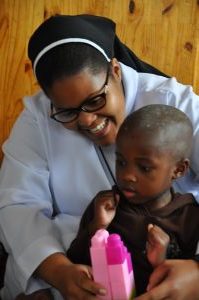In South Africa we live Ubuntu culture. The word means nothing else but humanity. It links very well with our Charism and calling as Franciscan Servants of the Holy Childhood of Jesus.

Ubuntu is a Zulu word which means “humanity” but it is so much more. It is the belief in a universal bond of sharing that connects all humanity. As a child in South Africa you grow up with the unspoken rule of living in communion with others in your everyday life. For example: When a family has lost a loved one in the community the neighbors share in their time of grieving – even if they didn’t know the person well. They comfort the mourning family and they contribute money and food for the funeral arrangements. Sometimes Ubuntu is reciprocal but it doesn’t have to be. Our congregation often financially assists women from the community in their studies. One of them came back to our children’s home to do voluntary work there, another one works for the convent in Mbongolwane now. These things often happen without having to demand or ask for them. They come out naturally as a part of Ubuntu culture.
In my belief, humanity plays a vital role in everyday life. If you want to understand an individual observe what she/ he does for people who give nothing back in return to the favor they offered – because it shows that they are doing it out of their own goodwill. In South Africa this is even more important than in other parts of the world, because there is such a huge gap between rich and poor. For us as sisters, humanity means extending unconditional love to each and every person being on earth. We express our Ubuntu culture and our charism in our apostolic commitment as teachers, catechists, social workers and child care workers. In the bible, St. Paul says in the letter to the Philippians: “In your relationship with one another, have the same mindset as Christ Jesus: Who, being in very nature God, did not consider equality with God something to be used to his own advantage rather he made himself nothing by taking the very nature of a servant, being made in human likeness and being found in appearance as a man, he humbled himself by becoming obedient to death even to death on a cross.” (Phil 2:5-8)
Translated to our life as sisters this means: We are not just closed up to ourselves and with the dealings of our convents but we should reach out to the world in order to make a positive impact on people’s lives. Our ministries at their core are a very human interaction. It must enrich the mind but it must also enrich the soul. Intellectual diligence must be accompanied by community building and social justice and unconditional love. In our Holy Childhood Convent school I encounter over 280 children who come from different family settings and backgrounds. Many of them are struggling in different ways. With courage we strive to become the kinds of teachers our students needs us to be by listening to them. Finding out what lies beneath their surface behavior. We always aim at getting to know individual learners, adapting methods for each individual, knowing when to push, when to pull back, when to ignore, when to encourage, when to praise, when to challenge and when to cheer. We treat our pupils with dignity, patience and kindness even when it makes our job harder at times.
To be human for us is to allow ourselves to be touched by the realities of others’ lives. This means that we give to women and children in need – as it is said in our mission statement. Every week we welcome people coming into our convent for food parcels and clothing. We believe the neighbor, that Jesus calls us to love, is any and every person. This is why we give these people not just material goods but our time and attention. We also empower those who are disadvantaged with skills and resources to become capable of providing for themselves and their loved ones. Women who learned their trades in one of our projects are now working as seamstresses in their home parishes, have started their own crèche (kindergarden) or care for our children in St. Joseph Child & Youth Care Center. Also, there are many people who assist us in our convents with cleaning, cooking, laundry and maintaining our gardens. They play a very vital role in our community, and we ensure to treat them with equal dignity.
In our projects we try to make a difference – as our calling as a sister and our principles of Ubuntu culture tell us to.
Text: Sr. Maria Machi
Pictures: Daniel Scharnagl


